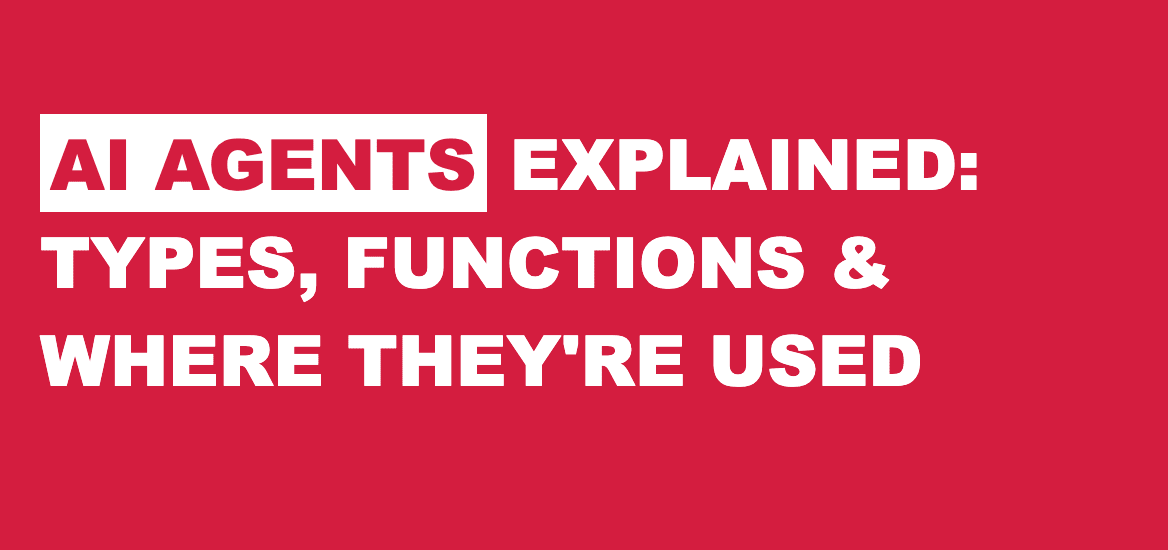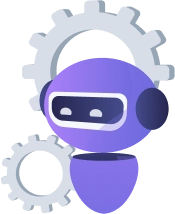AI Agents Explained: Types, Functions & Where They’re Used

Thinking….Looking….Searching for….thought for a couple of seconds…thank you…Does this sound friendly? Yes!! It’s exactly about the AI agents. AI, i.e., Artificial Intelligence, is now gaining popularity in different industries and has been beneficial in several ways. AI agents have uniquely reshaped the business and have redefined it with the machines.
However, there are different types of AI agents available in the market. Just imagine a world where software can interact with the user’s behavior and can directly make a decision based on the data collected. And here the credit goes to the AI agent. Nowadays, AI agents in everyday life have become a prerequisite for a business. Hence, businesses are seeking a top AI agent development company to develop the same. Let us understand more in-depth about AI agents, including the types, functions, and applications of AI agents.

What are AI Agents?
AI Agents, i.e., Artificial Agents, a software system that observes the environment, make decisions, and take action using AI techniques like NLP, ML, and computer vision. These actions are done without explicit human instructions. The AI agents are designed to make decisions, identifying users’ experience and also their adaptability to new situations.
Market Overview of AI Agents
With the growing trends and demand, the market research for AI agents shows that, in 2024, it has been valued at USD 5.25 billion. In 2025, the market is expected to grow to 7.84 billion 2025 and is expected to grow by USD 52.62 billion by 2030 at a CAGR of 46.3% during this forecast period.
Types of AI Agents
There are different types of AI agents available in the marketplace. Some of them include –
1. Simple Reflex Agents
Simple Reflex Agents are the basic type of AI agents. This type of AI game operates based on the condition and rules being triggered. However these AI agents lack memory and so are not capable of predicting the future based on past search or actions.
2. Model-Based Reflex Agents
Model-based reflex agents maintain an internal model of the environment. It makes an informed decision by analyzing and observing the current situation. This type of model helps to store and update the perception about how it works.
3. Goal-Based Agents
As the name suggests, Goal-based AI agents help to achieve specific goals by considering the future actions to be taken as per the current environment. Here with this agent, it can plan and select actions to be taken so as to achieve the desired result.
4. Utility-Based Agents
The term Utility-based agents is based on utility function. With this type of AI agent it helps to achieve the goal with quality state whereas maximizing the utility. This also measures if the desired outcome has been achieved or not. With this type of AI agent it performs actions that need maximum utility.
5. Learning Agents
These are learning agents that improve their performance by learning from the environment. There are different elements involved with this type of agent. This includes a performance element, a learning element and a critical element to analyze the performance. This AI agent has the capability to make it versatile with their adaptability with knowledge, behavior, and models.
6. Hierarchical Agents
Hierarchical agents as the name suggests are multi-level structured where the higher level agents offer guidance to lower level agents. This has a high capability of problem solving.
7. Multi-Agent System
Multi-Agent consists of several AI agents that interact with each other so as to achieve the desired goal. These agents are mainly used to solve complex problems that are not able to be done with individual agents.
Know more about: Designing User-Friendly AI Agents for Education
Functions of AI Agents
Some of the fundamental functions of AI Agents are as follows –
- Perception: Using the help of sensors, AI agents collect the data from the surroundings. Whereas in case of software, this can be taken as input for data feeds
- Decision Making: Selecting or taking an action based on predefined rules, patterns and different optimization strategies.
- Learning: AI Agents can improve learning algorithms by analyzing the past user behavior and performance. Accordingly can adapt with the changes as required
- Interaction: Using natural language processing, APIs and machine-to-machine communication protocols AI agents can communicate with the users
- Execution: The agent can deliver the desired response by updating the database
Applications of AI Agents
1. Healthcare
Integrating AI in healthcare helps assist surgery that reduces the risk of infection, better accuracy and also minimizes blood loss. It also has the capability to organize medical records that provide accuracy with work.
2. Education
Admin tasks can be automated with the help of AI agents in education. It can automate tasks like communication, courses, and also do personalized messaging. In the future with digitization it will help create a personalized learning environment for the students.
3. Ecommerce Marketplace
AI in ecommerce can improve inventory management by predicting the demand among the users and also optimizing the stock levels. This helps to enhance the user experience with personalization in products and implementing the best marketing strategies & campaigns.
4. Finance
AI agents in finance help in preventing fraud by analyzing the transaction, identify risk and accordingly take the measures. It provides instant support to customers, solves queries and provides personalized financial solutions to customers that enhances their engagement and satisfaction.
5. Manufacturing
AI in manufacturing helps in enhancing the efficiency & quality of the product with predictive maintenance. It minimizes the downtime that in turn enhances the quality control and reduces errors as well.
6. Marketing
Compared to others, AI agents in marketing are best as it helps to improve targeting by analyzing the user behavior and accordingly making the advertisement strategy. With the best advertisement strategies, it helps to boost the customer satisfaction with effective marketing methods.
7. Recruitment
In the recruitment process, AI helps to do the selection of candidates at ease with its ML algorithm that helps to evaluate candidates’ bio and creates a promoting diversity. AI agents can help to filter out resumes based on specific industry, field, education or any specific keyword. However, AI agents in recruitment made the talent acquisition process at ease.
Also read about: Top 10 Use Cases of AI Agents in Business
Revolutionize with AI Today!

Conclusion
AI agents are evolving in many industries and are not going to be a futuristic concept. It is embedded with its innovation in different industries that enhances efficiency in business. No matter if it is a business, whatever field it may be healthcare, finance, manufacturing, or education industry, an AI agent development company can offer the right solutions to support the brand growth for your business. Getting deeper in the world of AI is going to revolutionize many processes into automation and create new solutions of problem solving at ease.
Frequently Asked Questions
There are five main types of AI agents that include simple reflex agents, model-based agents, goal-based agents, utility-based agents and learning agents. Each type of agent has their own features and functionalities and delivers the result accordingly.
There is a difference between reactive and goal-based agents. In reactive agents it responds as per the current situation. For example, turning a light on when it is dark. Whereas goal-based agents, they take action to achieve the desired goal.
AI agents are used in different industries. They are used in industries like healthcare for diagnosis, work in finance to detect fraud, and drive self-driving cars. In education they act as tutors. Additionally, they are used in different industries like offices, hospitals, and stores.
In the robotics sector, AI agents help robots to think, decide and act. The data is taken from sensors, analyzes the environment and accordingly performs the desired action. This makes AI agents more smarter and be helpful in different tasks like cleaning, delivery, surgery, or factory work
Yes, AI agents learn and adapt over time. These are learning agents. They do by performing tasks and do the adjustments as per the user’s behavior. Learning helps AI agents become smarter and more helpful without needing constant updates from humans. This ability is what makes them truly intelligent and valuable in changing environments.
Utility-based agents are based on “utility”. It doesn’t just reach the goal but also find the best way to get the desired results. For example, if a robot delivers multiple paths or roadways, it will pick the fastest and safest route. This makes it make smarter, more human-like decisions by weighing outcomes and choosing what works best for the situation.
















